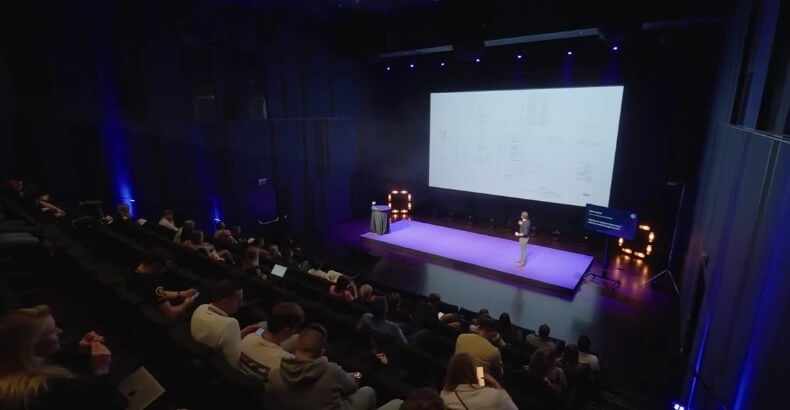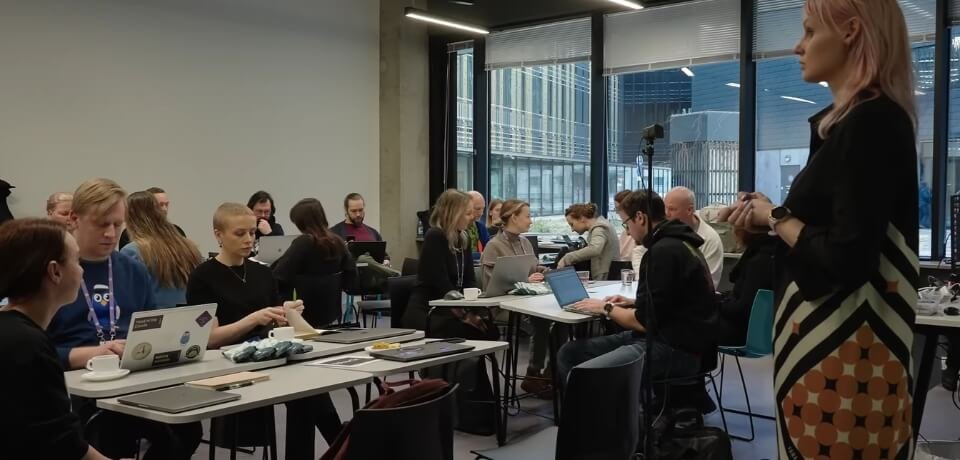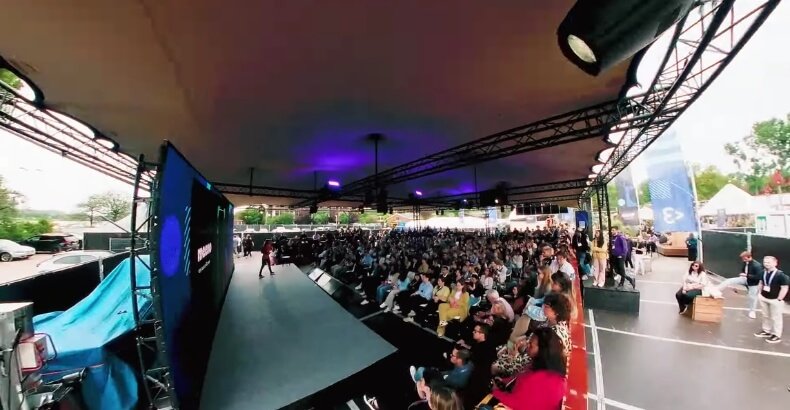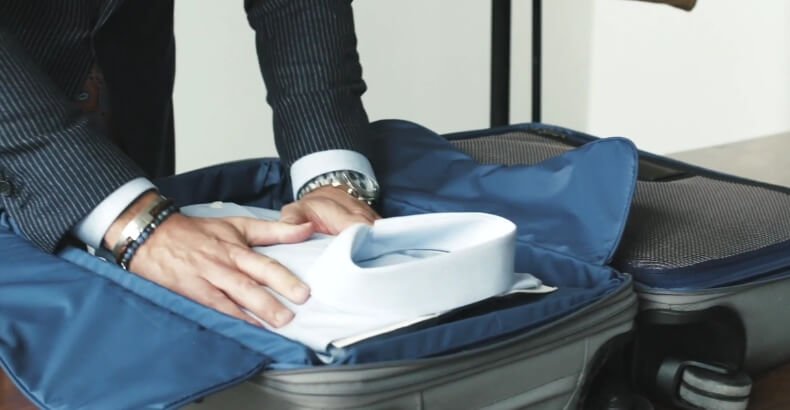Attending a business conference can be invaluable for your career, offering invaluable networking opportunities and fresh insights. However, the key to reaping these benefits lies in preparation. Knowing how to prepare for a business conference can set you apart and ensure you make the most of your time.
Start by outlining your goals for the event. Identify specific people you want to connect with and sessions that align with your interests. Next, gather your materials, from business cards to a polished elevator pitch, ensuring you’re ready to make a memorable impression.
As you continue reading, you’ll find practical tips to improve your conference experience. From packing essentials to strategies for effective networking, this guide will equip you to shine at your next business event.
What is the Importance of Conference Preparation?
Preparing for a conference is more than just packing your bags; it’s about setting the stage for a rewarding experience. For attendees, proper preparation can significantly impact the value they obtain from the event. Here’s why it matters.

Maximizing Networking Opportunities
One of the primary reasons people attend conferences is to connect with others in their field. By preparing in advance, you can identify key individuals you want to meet, such as industry leaders or potential collaborators.
Researching attendees and speakers ahead of time allows you to engage in meaningful conversations and establish lasting professional relationships.
Increasing Learning and Engagement
Conferences often feature a number of sessions, workshops, and keynote speeches. Knowing which sessions align with your interests helps you create a personalized agenda.
This targeted approach ensures you absorb relevant information that can enrich your skills and knowledge, making the experience more enriching.
Building Confidence
Walking into a conference unprepared can lead to anxiety. When you know your goals, have your materials ready, and understand the event layout, you’re more likely to feel confident.
This confidence not only helps you engage with others at the upcoming business conferences but also positions you as a proactive participant, which can leave a lasting impression.
Optimizing Time Management
Conferences can be overwhelming with so many activities happening simultaneously. Effective preparation allows you to prioritize your time, ensuring you don’t miss out on critical opportunities.
By creating a plan that includes breakout sessions, networking events, and personal downtime, you can get around the conference smoothly.
Follow-Up Strategy
Preparation extends beyond the event itself. Having a follow-up strategy in place allows you to maintain connections made during the conference. Whether it’s sending a quick email or connecting on LinkedIn, these actions can solidify the relationships you’ve built.
Investing time in conference preparation can contribute to your overall experience, making it more productive and enjoyable. With the right approach, you’ll walk away with valuable insights, connections, and a sense of accomplishment.
How to Prepare for a Business Conference: A Step-by-Step Guide
Preparing for a business conference can be a rewarding experience, offering opportunities for learning, networking, and professional growth.

Being aware of how to prepare for a business conference is essential, as a solid preparation plan not only maximizes your benefits but also helps you deal with the event with confidence. Here’s a step-by-step guide to ensure you’re ready for your next conference.
Step 1: Define Your Objectives
Before you even register for the conference, take a moment to reflect on what you hope to achieve. Are you looking to expand your network, gain industry insights, or showcase your expertise?
Setting clear objectives will guide your preparation and help you focus on the right sessions and networking opportunities.
Step 2: Research the Conference
Once you’re registered, dive into the conference agenda. Review the list of speakers, sessions, and workshops.
Familiarize yourself with the topics being discussed, and identify those that align with your interests and professional goals. This research will help you create an efficient schedule that maximizes your time at the event.
Step 3: Prepare Your Materials
Equipping yourself with the right materials is essential. Start by updating your business cards; these are essential for making connections.
Additionally, prepare an elevator pitch— a brief introduction that summarizes who you are, what you do, and what you’re looking for. Having these materials ready ensures you make a strong first impression.
Step 4: Schedule Meetings in Advance
Networking is one of the primary reasons people attend conferences. If there are specific individuals you want to meet, consider reaching out before the event to schedule a brief meeting or coffee chat.
This constructive approach shows your enthusiasm and makes it easier to connect amidst the busy conference atmosphere.
Step 5: Pack Strategically
When it comes time to pack, think beyond the basics. Bring a professional outfit that makes you feel confident and comfortable, as first impressions matter. You should follow a step-by-step conference preparation checklist and consider including a portable charger for your devices, a notebook for taking notes, and any necessary tech gear. Having these essentials on hand ensures you’re prepared for any situation.
Step 6: Set Personal Goals for Each Day
As the conference unfolds, set personal goals for each day. Whether it’s meeting a certain number of new people or attending specific sessions, having daily objectives keeps you focused and motivated.
This structured approach can greatly improve your overall experience and make the event more fulfilling.
Step 7: Stay Engaged During Sessions
When attending sessions, be an active participant. Take notes, ask questions, and engage with speakers and fellow attendees. This not only contributes to your learning experience but also positions you as a dedicated participant, making it easier to connect with others who share your interests.
Step 8: Network Effectively
Networking doesn’t just happen at formal events; it can occur in any setting. Make an effort to engage with fellow attendees during breaks, meals, and even in line for coffee.
Approach conversations with genuine curiosity—ask about their experiences and share your insights. Building authentic connections can lead to fruitful collaborations and lasting relationships.
Step 9: Follow Up After the Conference
Once the conference concludes, don’t let your connections fizzle out. Reach out to the people you met with a personalized message, referencing your conversation.
Whether it’s connecting on LinkedIn or sending a quick email, following up solidifies the relationships you’ve built and opens the door for future collaboration.
Step 10: Reflect on Your Experience
Finally, take some time to reflect on the conference. What did you learn? How did your networking efforts pan out? Reflecting on your experience helps you identify areas for improvement and sets the stage for even more effective preparation next time.
Preparing for a business conference involves thoughtful planning and proactive engagement. By defining your objectives, researching the event, and actively participating, you can turn a conference into a meaningful and productive experience.
Whether you’re seeking knowledge, connections, or opportunities, this step-by-step guide will help you make the most of your next business conference.
What Are the Key Items to Pack for Your Business Conference?
Packing for a business conference can feel complicated, but with the right items, you’ll be well-prepared for a successful experience. Here’s a list of essential items to consider, to ensure you make the most of your time at the event.

Business Cards
Your business card is your calling card in the professional world. Ensure you have plenty on hand to share during networking opportunities. It’s a simple yet effective way to leave a lasting impression. Make sure the design is professional and includes your current contact information.
Technology Essentials
Bring your laptop or tablet for taking notes or accessing important documents. Don’t forget your phone, charger, and any necessary adapters. A portable charger can also be a lifesaver, keeping your devices powered throughout long conference days.
Notepad and Pens
Although digital notes are convenient, a notepad and pens are essential must-have items for conference preparation. They allow you to quickly jot down ideas or key takeaways during sessions, especially when you need to capture information at the moment. Choose a compact, easy-to-carry notebook and pens that write smoothly to ensure your note-taking experience is both efficient and enjoyable.
Professional Attire
First impressions matter, so plan your outfits carefully. Bring a few business-appropriate outfits that are comfortable yet polished. Layering is a smart strategy, as conference venues can vary in temperature. A blazer or light sweater can elevate your look and keep you warm during chilly sessions.
Comfortable Shoes
Conferences often require a lot of walking, whether you’re moving throughout the venue or networking in crowded spaces. Pack comfortable shoes that you can wear throughout the day. Stylish yet practical footwear will keep your feet happy and ensure you can focus on the conference rather than discomfort.
A Reusable Water Bottle
Staying hydrated is crucial during a busy conference. A reusable water bottle not only helps you stay refreshed but also reduces waste. Many venues offer refill stations, so keep your bottle filled to ensure you’re energized throughout the day.
A Small Snack Bag
Conference schedules can be packed, making it easy to miss meal times. Packing healthy snacks, like nuts or protein bars, will keep your energy levels up. Having something to munch on can also provide a welcome break between sessions.
A Backup Plan
Things don’t always go as planned, so having a backup plan can ease any potential stress. Consider packing a spare outfit or an extra charger. Having a few contingency items can help you deal with unexpected situations with confidence.
Packing for a business conference doesn’t have to be overwhelming. With these essential items in your bag, you’ll be ready to tackle the event with confidence and professionalism.
Tips for Effective Networking at Business Conferences
Networking at business conferences can be a powerful way to build connections and open doors for future opportunities. However, making the most of these interactions requires a thoughtful approach. Here are some tips to maximize your networking experience.
Set Clear Goals
Make sure you define your goals before the conference. Are you looking to connect with industry leaders, explore collaboration opportunities, or simply expand your professional circle? Having clear goals will help you stay focused and make the most of your time.
Do Your Homework
Familiarize yourself with the conference agenda and the attendees. Research speakers and participants who align with your interests. This preparation not only helps you engage in meaningful conversations but also shows that you’re genuinely interested in what others have to say.
Perfect Your Elevator Pitch
Your elevator pitch is your chance to make a strong first impression. Keep it concise and engaging, summarizing who you are, what you do, and what you’re looking for. Customize your pitch to the person you’re speaking with, so it feels more personal and relevant.
Be Approachable
Body language plays a crucial role in networking. Stand or sit with an open posture, maintain eye contact, and smile. If you’re engrossed in your phone or appear closed off, you may miss out on valuable interactions. Remember, you’re there to connect, so be inviting.
Ask Open-Ended Questions
When you strike up a conversation, avoid yes-or-no questions. Instead, ask open-ended questions that encourage dialogue. For instance, ask about the challenges others face in their industry or what excites them about upcoming trends. This approach promotes deeper discussions and helps you learn more about the other person.
Follow Up
After the conference, don’t let your new connections fade away. Send a brief follow-up email or a LinkedIn message expressing your pleasure in meeting them. Mention something specific from your conversation to personalize your message. This simple step can reinforce the connection and keep the conversation going.
Be Authentic
Lastly, be yourself. Authenticity resonates with people and fosters genuine relationships. Share your experiences and interests honestly, and don’t hesitate to show enthusiasm for your field. People are drawn to authenticity, which can make your networking efforts more effective.
By employing these tips, you can manage business conferences with confidence and create lasting connections that could benefit your career for years to come.
How to Manage Your Time During the Conference?
Managing your time effectively during a conference can significantly improve your experience and ensure you get the most out of the event. With multiple sessions, networking opportunities, and social events contending for your attention, it’s crucial to approach the conference with a clear strategy. Here are some key ways to manage your time efficiently from an attendee’s perspective.

Prioritize Sessions
Conferences often offer a wide array of sessions and workshops, which can be exhausting. Review the agenda ahead of time and prioritize the sessions that resonate most with your goals.
Consider making a “must-see” list that includes keynotes, panels, and breakout sessions that offer the most value to you. This way, you won’t waste time trying to decide on the fly.
Create a Flexible Schedule
Once you have your prioritized list, draft a rough schedule. Block out time for each session and any networking events you want to attend.
However, keep in mind that flexibility is essential. Sometimes, a spontaneous conversation or an unexpected opportunity can be more valuable than sticking rigidly to your plan.
Use Technology to Your Advantage
Most conferences today provide apps or platforms that allow you to manage your schedule. These tools often feature reminders for session times, speaker information, and networking opportunities.
Utilizing technology can help you stay organized and informed, ensuring you don’t miss important sessions or events.
Balance Learning and Networking
While attending sessions is vital for your professional growth, networking is equally important. Make a conscious effort to strike a balance between the two.
Allocate specific times for networking—perhaps during breaks or designated social events. Engaging with fellow attendees can lead to valuable connections that can benefit your career.
Stay Engaged During Sessions
When attending sessions, be present and engaged. Take notes, ask questions, and participate in discussions. This active involvement not only deepens your knowledge but also helps you connect with speakers and fellow attendees.
It’s a great way to make the most of your time and gather insights that will be beneficial long after the conference ends.
Take Breaks and Reflect
Amidst the hustle and bustle, don’t forget to schedule some downtime. Attending a conference can be mentally exhausting, so give yourself permission to take breaks.
Use this time to reflect on what you’ve learned and to recharge. A clear mind will help you make the most of your remaining time.
Managing your time at a conference requires planning, flexibility, and active engagement. By setting clear goals, prioritizing your sessions, and balancing learning with networking, you can create a fulfilling experience that meets your professional needs.
What to Do After the Conference: Follow-Up Strategies
Attending a conference is just the beginning of the journey; the real work often starts afterward. Follow-up strategies are essential to maximize the connections you’ve made and the insights you’ve gained. Here’s how to effectively manage this crucial phase.
Reconnect With Contacts
Soon after the conference, make it a priority to reach out to the people you meet. A simple email thanking them for their time can go a long way. Mention something specific from your conversation to jog their memory.
This personal touch demonstrates genuine interest and helps solidify the relationship. If you exchanged business cards, this is the perfect time to put them to use.
Share Valuable Insights
Reflect on the key takeaways from the sessions you attended. Consider sharing these insights with your contacts through a follow-up email or on social media.
This not only positions you as someone who adds value but also keeps the conversation going. You might even ignite discussions that lead to further connections or collaborations.
Connect on Social Media
Utilize platforms like LinkedIn to expand your network. Sending personalized connection requests to fellow attendees or speakers can open new doors.
When you connect, include a note about where you met and what you discussed. This keeps the memory alive and shows you are proactive about nurturing your network.
Set Up One-on-One Meetings
If you found particular individuals whose work resonates with you, consider suggesting a one-on-one meeting.
Whether it’s a virtual coffee chat or an in-person meeting, this is an excellent way to deepen your connection and explore potential collaborations. People appreciate when someone takes the initiative, and it can lead to fruitful discussions.
Follow Up on Promises
If you discussed sending materials or resources during the conference, make sure to follow through. Sharing relevant articles, tools, or insights demonstrates your commitment and helps establish your credibility. It also keeps you top of mind for future opportunities.
Measure Your Experience
Finally, take some time to assess your overall conference experience. What worked well for you? What could you improve upon for next time? Documenting your thoughts can guide your preparations for future events and help you become a more effective networker.
The follow-up phase is vital for capitalizing on the connections and insights gained from a conference. By reaching out, sharing knowledge, and continuing the conversation, you can turn fleeting interactions into meaningful relationships that benefit your professional journey.
Common Mistakes to Avoid When Preparing for a Business Conference
Attending a business conference can be an incredible opportunity for learning and networking, but preparation is key. Many attendees unknowingly make mistakes that can diminish their experience. Here are some common pitfalls to avoid.

Neglecting Research
One of the biggest mistakes is not researching the conference agenda or speakers beforehand. Familiarizing yourself with the sessions and keynotes allows you to prioritize what aligns with your goals. Skipping this step may lead you to miss out on valuable insights and connections.
Ignoring Networking Opportunities
Conferences are prime networking venues, but failing to plan for this can be detrimental. Don’t wait until you arrive to think about who you want to meet. Check the attendee list and reach out to individuals you’re interested in connecting with. Having a plan helps you make the most of these interactions.
Overpacking or Underpacking
Packing the right items can significantly impact your comfort and preparedness. Overpacking can weigh you down while underpacking can leave you scrambling. Consider essentials like business cards, a notepad, and appropriate attire. Remember, a well-thought-out packing list can streamline your experience.
Setting Unrealistic Goals
While it’s great to have ambitious goals, setting unrealistic expectations can lead to disappointment. Instead of trying to meet everyone or attend every session, focus on a few key objectives. This targeted approach allows you to engage deeply and make meaningful connections.
Failing to Prepare for Follow-Ups
Networking doesn’t end when the conference does. Many attendees forget to have a follow-up strategy in place. After collecting contacts, plan how you’ll reach out. A simple thank-you email or a connection request on LinkedIn can go a long way in solidifying relationships.
Forgetting to Take Breaks
Conferences can be stressful, with back-to-back sessions and networking events. Failing to schedule breaks can lead to burnout. Allow yourself some downtime to recharge and reflect on what you’ve learned. This balance will keep you energized and engaged.
Not Analyzing Your Experience
After the conference, take a moment to assess what you’ve gained. Reflect on the sessions that were most impactful and the connections you made. This analysis will help you set better goals for future events.
By avoiding these common mistakes, you’ll maximize your conference experience and make the most of every opportunity that comes your way.
Frequently Asked Questions
Here are some frequently asked questions about preparing for a business conference. These insights can help clarify your approach and ensure you make the most of your experience.
Should I Research Speakers Before the Conference?
Absolutely! Researching speakers allows you to identify their expertise and relevance to your interests. This knowledge helps you engage in thoughtful discussions and make meaningful connections during the event, increasing your overall experience.
Can I Attend Multiple Sessions at the Same Time?
No, attending multiple sessions simultaneously is not possible. However, you can choose the most relevant sessions based on your goals and interests, ensuring that you gain the insights that matter most to you.
Should I Bring Business Cards to the Conference?
Definitely! Business cards are essential for effective networking. They provide a tangible way to exchange contact information and leave a lasting impression, making it easier for others to remember you after the conference.
Is it Important to Dress Professionally for the Conference?
Yes, dressing professionally is vital as it reflects your commitment and seriousness. Appropriate attire not only boosts your confidence but also influences how others perceive you, helping you make a positive first impression.
Can I Use My Phone During Sessions?
While it’s acceptable to use your phone for taking notes or referring to the agenda, it’s best to minimize distractions. Paying attention and engaging fully in the sessions shows respect for the speakers and improves your learning experience.
Final Thoughts
As you gear up for your next event, remember that the effort you put into preparation can make all the difference. Knowing how to prepare for a business conference equips you with the tools to deal with the experience effectively and confidently.
By setting clear goals, researching attendees, and planning your schedule, you’ll create opportunities for meaningful interactions and valuable learning. Each connection and insight gained can pave the way for future success.
So, take a deep breath, stay organized, and take advantage of the experience. With the right mindset and preparation, your conference journey will be not just productive but also enjoyable, leaving you eager for the next opportunity to shine.